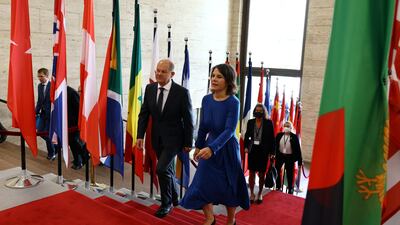As European countries battle successive wildfires fuelled by severe drought and extreme heat, United Nations Secretary General Antonio Guterres issued a dire warning to senior officials from 40 countries attending a two-day meeting in Berlin on Monday to discuss how to tackle climate change and its effects.
In a video address to those assembled at the Petersberg Climate Dialogue in the German capital, the UN chief called on political leaders to meet their international climate finance promises and “take responsibility for our collective future”.
He said the limit of 1.5°C agreed in the 2015 Paris climate accord was slipping further out of reach even as more people around the world are hit by extreme floods, droughts, storms and wildfires.
“Nations continue to play the blame game instead of taking responsibility for our collective future,” he said. “We cannot continue this way. We must rebuild trust and come together — to keep 1.5 alive and to build climate-resilient communities. Promises made must be promises kept. We need to move forward together on all fronts. Mitigation. Adaptation. Finance. Loss and Damage”.
The 13th Petersberg Climate Dialogue, co-chaired by Egyptian President Abdel Fatah El Sisi and German Chancellor Olaf Scholz, hosted open discussions in small groups on the big issues in international climate policy.
Preliminary discussions have been hosted by Germany every year in advance of the UN Climate Change Conference, to be held this November in the coastal city of Sharm El Sheikh in Egypt as Cop27.
German Foreign Minister Annalena Baerbock said the country was “pulling out all the stops of our diplomacy to fight climate change,” calling the Petersberg Dialogue an opportunity to work “with our Egyptian partners” on issues now to “set the course for a successful Cop 27”.
While references were made to global politics and the impact the Russia invasion of Ukraine is having on energy supplies, many of the delegates began the session by taking sombre note of the effect of global warming through the uncharacteristically hot temperatures ravaging parts of the world.
“As this meeting is taking place, parts of Europe are baking,” said Alok Sharma, the British MP who was president of last year’s Cop26 talks in Glasgow, Scotland.
“Indeed, they’re burning and, sadly, it’s an experience that is all too familiar to many millions across the globe already. My plea to you all is, please, let’s speed up our work.”
Egyptian Foreign Minister Sameh Shoukry said it was “incumbent to act swiftly” on climate change and warned against the “current state of affairs” being used as an excuse to “backtrack or renege on previous commitments — especially those related to supporting developing countries”.
Campaigners are increasingly worried that the war in Ukraine and disrupted energy and food supplies will sideline commitments to tackle climate change.
“I hear the concerns of those who ask us whether the countries of Europe and Germany are now backtracking on their climate commitments because of the Russian war,” Ms Baerbock said in her opening speech.
“And I will say frankly: we have to make difficult short-term decisions that we don't like in order to reduce our dependence on Russian gas and oil. We need to set up coal-fired power plants as a reserve for a short period of time — but only as a reserve. This does not mean that we are abandoning the 1.5ºC target.”
Climate Action Network (Can), a network of more than 1,800 civil society organisations in more than 130 countries, said they hoped Berlin would not “be another empty talk shop”.
“As we face shattering heatwaves, floods, and droughts, wealthy countries’ pattern of delay on climate action is glaring. Rich nations’ response to the climate emergency is disconnected from reality, ignoring the urgency of tackling losses and damages and continuing to fuel the fire by propping up the fossil fuel industry,” said Eddy Pérez, Can’s international climate diplomacy manager, before the meeting.
He said the Petersberg dialogue was a chance to “set the stage for real progress and honest solidarity at Cop 27”.
Campaigners are calling on the issue of loss and damage to be placed on the November summit’s agenda. Financing was the first topic of discussion during opening presentations in Berlin on Monday.
Developing countries are still waiting for rich nations to provide $100 billion in climate aid each year, a target they were meant to reach by 2020.
Mr Guterres urged rich nations to keep the promises they have made with regard to supplying funds to tackle the situation.
“At a minimum at the very least, stop paying lip service to the $100 billion dollars a year pledge,” he said.
“Give clarity through deadlines and timelines and get concrete on its delivery.”
While Ms Baerbock said she was committed to hitting the climate finance goal, big polluters, however, have long resisted the idea that they should pay for the destruction their greenhouse gas emissions are causing.
The closed-door meeting in Berlin started with expert presentations to ministers on the issue of loss and damage, which was followed by group discussions.
Organisers have billed these latest talks as an opportunity to rebuild trust between rich and poor nations. The Berlin talks follow the Bonn Climate Change Conference and G7 Summit in June.
Germany’s climate envoy Jennifer Morgan said the Petersberg Dialogue was a “space to build trust and identify where we can come together and co-operate”.




















